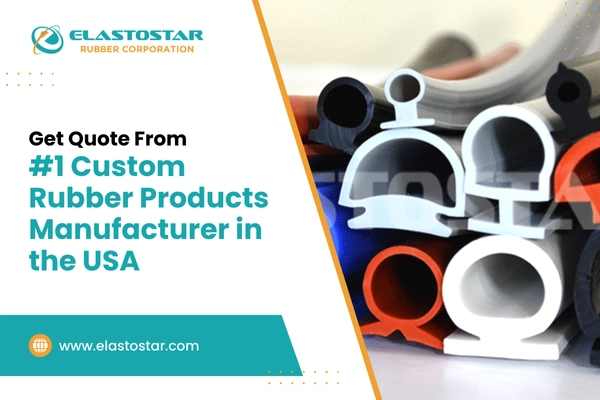Silicone rubber is widely used across industries, but not all silicone is the same. The difference between food grade FDA silicone rubber and regular silicone is critical, especially for applications involving food safety, medical devices, and manufacturing. Silicone food safety requires materials that meet strict FDA compliance standards to ensure non-toxicity, durability, and high performance.
Food grade silicone is specifically designed for environments where safety and compliance are essential, while regular silicone lacks these certifications and may not be safe for such applications.
In this blog, we’ll explore the key distinctions, applications, and benefits of FDA silicone rubber compared to regular silicone.
Table of Contents
What is Silicone Rubber?

Silicone rubber is a synthetic silicone material composed of silicon, oxygen, carbon, and hydrogen. Known for its durability, flexibility, and resistance to extreme temperatures (-60°C to 230°C), it performs reliably in demanding environments. Additionally, silicone rubber resists UV radiation, aging, and harsh chemicals, ensuring long-lasting performance.
Due to these properties, silicone rubber is widely used in products like silicone rubber seals, gaskets, and tubing, and is essential in industries like automotive, food processing, and healthcare. Its unique ability to tolerate challenging environments makes it an ideal material for high-performance applications.
What is Food Grade FDA Silicone Rubber?
Food grade silicone is a specialized form of silicone rubber that meets stringent FDA certification standards, ensuring it is safe for direct contact with food and beverages. It is free from harmful chemicals, making it non-toxic and odorless. Additionally, food grade silicone is chemically inert, meaning it does not react with food or beverages, preserving their safety and integrity.
Food grade silicone is also resistant to extreme temperatures (-60°C to 230°C), making it a reliable high-temperature silicone for kitchenware, baking molds, and food processing equipment. It is widely used in products like gaskets, seals, tubing, and baby products, ensuring safe and long-lasting performance in sensitive environments.
What is Regular Silicone?
Regular silicone rubber is a type of silicone material commonly used in industrial applications such as automotive parts, electrical insulation, and general-purpose seals. Its flexibility, durability, and resistance to harsh conditions make it suitable for non-food environments.
However, regular silicone lacks FDA certification, making it unsuitable for food-related uses. It may contain impurities or chemicals that can leach into food, posing safety risks. Additionally, it does not undergo the same rigorous manufacturing and testing processes as FDA silicone rubber, limiting its use in applications where safety and compliance are essential.
Differences Between Food Grade FDA Silicone Rubber and Regular Silicone
Understanding the differences between FDA approved silicone rubber and regular silicone is essential for selecting the right material for specific applications.
1. Material Purity
Food-grade silicone adheres to stricter purity standards compared to regular silicone rubber materials. It is free from harmful chemicals and toxins, ensuring safety for food contact, while regular silicone may contain impurities unsuitable for sensitive environments.
2. Certifications
Food grade silicone is FDA compliant, meaning it meets stringent safety standards for use in food and medical applications. In contrast, regular silicone lacks FDA certification, making it unsuitable for food-related uses or direct contact with consumables.
3. Applications
FDA approved silicone rubber is widely used in kitchenware, baking, medical tubing, and baby products, where safety is critical. Regular silicone, on the other hand, is more suited for industrial applications like automotive seals, electrical insulation, and general-purpose components.
4. Durability
Food grade silicone offers higher resistance to extreme temperatures, chemicals, and wear, ensuring safe performance in demanding environments. Regular silicone, while durable, does not provide the same level of safety or reliability required for sensitive applications.
By understanding these distinctions, manufacturers, and consumers can make informed choices when selecting silicone for specific needs.
| Feature | Food Grade FDA Silicone | Regular Silicone |
| Material Purity | Free from harmful chemicals and toxins | May contain impurities |
| Certifications | FDA compliant for food and medical safety | Lacks FDA certification |
| Applications | Kitchenware, medical tubing, baby products | Automotive seals, electrical insulation |
| Durability | Resistant to heat, chemicals, and wear | Durable but unsuitable for food safety |
What are the Applications of Food Grade FDA Silicone Rubber?

FDA silicone rubber is a versatile material widely used in applications that require safety, durability, and compliance with food and medical standards.
1. Kitchenware
Food grade silicone is commonly used to manufacture baking, cooking utensils, molds, and other cookware. Its resistance to high temperatures and non-toxic nature make it ideal for direct contact with food.
2. Food Processing Equipment
In food production facilities, high-temperature silicone sponge gaskets, seals, and tubing are critical components. These products ensure the safe and efficient handling of food during processing and packaging.
3. Baby Products
FDA-approved silicone is a trusted material for baby products such as pacifiers, bottle nipples, and teething rings. Its chemical inertness and safety for direct contact provide peace of mind for parents.
4. Medical Uses
Food grade silicone is also utilized in medical applications, including tubing, implants, and other devices. Its biocompatibility, non-toxicity, and ability to endure sterilization processes make it ideal for healthcare uses.
Food grade silicone’s unique properties and safety certifications make it an essential material across industries requiring direct contact with food or the human body.
Read More- Why FDA-Approved Silicone Rubber is Preferred for Food Industry Gaskets & Seals
Testing and Certification of Food Grade FDA Silicone
Ensuring FDA-compliant silicone meets safety and quality standards requires rigorous testing and certification. Elastostar Rubber Corporation holds certifications confirming its compliance and safety for food contact.
1. Testing Process
Silicone intended for food-grade applications undergoes strict evaluations to ensure it is free from harmful chemicals, toxins, and contaminants.
- Chemical Composition Testing: Verifies the absence of hazardous substances.
- Temperature Resistance Testing: Confirms performance under extreme heat or cold.
- Migration Testing: Ensures no harmful substances leach into food during contact.
- USP Class VI Testing: Our materials are tested and certified with USP Class VI Section 88 and 87 pass, confirming biocompatibility and non-toxicity for food and medical applications.
2. FDA Certification
To achieve FDA certification, silicone must comply with the U.S. Food and Drug Administration’s (FDA) standards outlined in 21 CFR 177.2600. This regulation governs the use of elastomers in food-contact applications, ensuring they are safe, durable, and non-toxic.
3. International Standards
In addition to FDA compliance, materials may also adhere to global standards like:
- USP Class VI: Ensures materials meet biocompatibility standards.
- LFGB (Germany): Ensures safety for food contact materials.
- EU Regulation 1935/2004: Covers food safety in the European Union.
These certifications validate the quality and safety of silicone products across international markets.
4. Importance of Certified Materials
Choosing certified materials is essential for food-contact applications.
- Protect consumer health by preventing contamination.
- Ensure compliance with regulatory requirements.
- Build trust in the safety and quality of the final product.
Benefits of Using Food Grade FDA Silicone Rubber
| Benefit | Description |
| Safe and Non-Toxic | Meets silicone food safety standards, ensuring it is free from harmful chemicals and odorless. |
| Highly Durable | Resistant to high temperatures, chemicals, and wear, maintaining performance in extreme conditions. |
| Versatile Applications | Used in kitchenware, medical tubing, seals, and gaskets, adapting to various environments. |
| Environmentally Friendly | Reusable and long-lasting, reducing waste and serving as a sustainable alternative to disposable plastics. |
Why Choose Elastostar Rubber Corporation for FDA Silicone Products?
We at Elastostar Rubber Corporation specialize in custom silicone rubber parts and FDA silicone tubing, delivering high-quality, FDA-compliant solutions for food, healthcare, and industrial needs. With our expertise and commitment to precision, we ensure reliable, durable, and safe products to meet your requirements.
Contact us today to learn how we can provide the perfect FDA silicone solutions for your business.
Recommended Reads
- What is Rubber Extrusion?
- FDA Silicone Meaning, Properties, and Considerations
- Silicone Rubber Temperature: How Much Heat Can It Withstand?

Conclusion
Food grade FDA silicone rubber is essential for ensuring safety, compliance, and reliability in food and medical applications. Its non-toxic, chemically inert, and durable properties make it ideal for critical products like silicone rubber seals, gaskets, and tubing. Unlike regular silicone, which lacks FDA certification, FDA-compliant silicone meets stringent regulatory standards, ensuring safe and high-quality solutions for demanding environments.
FAQs
1. How can you tell if silicone is food grade?
To identify food grade silicone, look for labels or certifications such as FDA compliant or LFGB approved. Food grade silicone is odorless, non-toxic, and free from harmful chemicals. At Elastostar Rubber Corporation, we ensure all our food grade silicone products meet the highest standards of safety and compliance.
2. Is all 100% silicone food grade?
Not all 100% silicone is food grade. While 100% silicone indicates the material is pure silicone, only FDA-certified silicone guarantees safety for food contact. Always check for certifications or labels to ensure you’re using safe materials. Elastostar provides FDA-compliant silicone products, ensuring the highest level of quality and safety for food-related applications.
3. Does food grade silicone smell like rubber?
No, food-grade silicone should not smell like rubber. It is manufactured to be odorless and free from residual chemicals. If a silicone product has a strong odor, it is likely not food grade or made with lower-quality materials. Elastostar ensures all our food grade silicone products are odorless and meet stringent quality standards.
4. What type of silicone is used for cooking?
Food grade silicone is the type used for cooking and baking. It is heat-resistant, non-toxic, and does not react with food. Common applications include baking mats, cooking utensils, molds, and gaskets used in food processing. Elastostar offers FDA-certified food grade silicone solutions perfect for kitchenware and industrial food applications.
5. What is the difference between food grade silicone and medical-grade silicone?
The main difference lies in their purity and applications. Food grade silicone is designed for safety in food contact and complies with FDA standards. Medical-grade silicone, on the other hand, has even higher purity and biocompatibility, making it suitable for medical devices and implants. Elastostar specializes in both food grade and custom silicone solutions. Reach out to us for reliable products customized to your needs.
6. Does FDA approved mean food grade?
Yes, FDA approved means the material meets strict safety and non-toxicity standards, making it suitable for food contact. At Elastostar, we prioritize FDA compliance for all our food grade silicone products to ensure reliability and safety.



